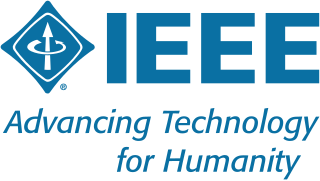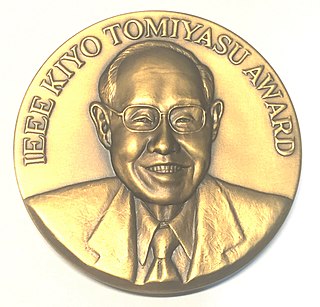
The Institute of Electrical and Electronics Engineers (IEEE) is an American 501(c)(3) professional association for electronics engineering, electrical engineering, and other related disciplines.
George David Forney Jr. is an American electrical engineer who made contributions in telecommunication system theory, specifically in coding theory and information theory.
Michael Shur is a Russian and American physicist and a professor of solid state electronics and electrical engineering at Rensselaer Polytechnic Institute.
The IEEE Richard W. Hamming Medal is presented annually to up to three persons, for outstanding achievements in information sciences, information systems and information technology. The recipients receive a gold medal, together with a replica in bronze, a certificate and an honorarium.

Asad Ali Abidi is a Pakistani-American electrical engineer. He serves as a tenured professor at University of California, Los Angeles, and is the inaugural holder of the Abdus Salam Chair at the Lahore University of Management Sciences (LUMS). He is best known for pioneering RF CMOS technology during the late 1980s to early 1990s. As of 2008, the radio transceivers in all wireless networking devices and modern mobile phones are mass-produced as RF CMOS devices.
The IEEE Robert N. Noyce Medal is a science award presented by the IEEE for outstanding contributions to the microelectronics industry. It is given to individuals who have demonstrated contributions in multiple areas including technology development, business development, industry leadership, development of technology policy, and standards development. The medal is named in honour of Robert N. Noyce, the co-founder of Intel Corporation. He was also renowned for his 1959 invention of the integrated circuit. The medal is funded by Intel Corporation and was first awarded in 2000.
Ali H. Sayed is the dean of engineering at EPFL, where he teaches and conducts research on Adaptation, Learning, Statistical Signal Processing, and Signal Processing for Communications. He is the Director of the EPFL Adaptive Systems Laboratory. He has authored several books on estimation and filtering theories, including the textbook Adaptive Filters, published by Wiley & Sons in 2008. Professor Sayed received the degrees of Engineer and Master of Science in Electrical Engineering from the University of São Paulo, Brazil, in 1987 and 1989, respectively, and the Doctor of Philosophy degree in electrical engineering from Stanford University in 1992.
The IEEE Jack S. Kilby Signal Processing Medal is presented "for outstanding achievements in signal processing" theory, technology or commerce. The recipients of this award will receive a gold medal, together with a replica in bronze, a certificate and an honorarium.
The IEEE Dennis J. Picard Medal for Radar Technologies and Applications is an award presented for outstanding accomplishments in advancing the fields of radar technologies and their applications. This award can be presented to an individual or group of up to three people.
The IEEE Gustav Robert Kirchhoff Award is a Technical Field Award established by the IEEE Board of Directors in 2003. This award is presented for outstanding contributions to the fundamentals of any aspect of electronic circuits and systems that has a long-term significance or impact.
The IEEE Undergraduate Teaching Award is a Technical Field Award of the IEEE that was established by the IEEE Board of Directors in 1990. It is presented for inspirational teaching of undergraduate students in the fields of interest of the IEEE.

The IEEE Kiyo Tomiyasu Award is a Technical Field Award established by the IEEE Board of Directors in 2001. It is an institute level award, not a society level award. It is presented for outstanding early to mid-career contributions to technologies holding the promise of innovative applications. The prize is sponsored by Dr. Kiyo Tomiyasu, the IEEE Geoscience and Remote Sensing Society, and the IEEE Microwave Theory and Techniques Society (MTT).
The IEEE Richard M. Emberson Award was established by the IEEE Board of Directors in 1986. It is presented to an IEEE member for distinguished service to the development, viability, advancement, and pursuit of the technical objectives of the IEEE.
Professor Shlomo Shamai (Shitz) (Hebrew: שלמה שמאי (שיץ) ) is a distinguished professor at the Department of Electrical engineering at the Technion − Israel Institute of Technology. Professor Shamai is an information theorist and winner of the 2011 Shannon Award.
The IEEE Biomedical Engineering Award is a Technical Field Award of the IEEE given annually for outstanding contributions to the field of biomedical engineering. It was established in 2010.
Andrew Patrick Sage was an American systems engineer and Emeritus Professor and Founding Dean Emeritus at the School of Information Technology and Engineering of the George Mason University.
In 2002, the Institute of Electrical and Electronics Engineers (IEEE) added a new award to its already existing program of awards. Each year, one or more nominees are honored with a medal in the name of Jun-ichi Nishizawa, considered to be the father of Japanese microelectronics. Nishizawa was professor, director of two research institutes and the 17th president at Tohoku University, Sendai, Japan, and contributed important innovations in the fields of optical communications and semiconductor devices, such as laser and PIN diodes and static induction thyristors for electric power applications.
The Engineering and Technology History Wiki (ETHW) is a MediaWiki-based website dedicated to the history of technology. It started operating in 2015. It consists of articles, first-hand accounts, oral histories, landmarks and milestones.
The IEEE Innovation in Societal Infrastructure Award is a Technical Field Award established by the IEEE Board of Directors in 2011. The IEEE Technical Field Awards are awarded for contributions or leadership in specific fields of interest of the IEEE.
The IEEE Transportation Technologies Award is a technical field award given for advances in technologies within the fields of interest to the IEEE as applied in transportation systems. This IEEE-level award, was created in 2011 by the board of directors of the IEEE and sponsored by the IEEE Industry Applications Society, IEEE Industrial Electronics Society, IEEE Intelligent Transportation Systems Society, IEEE Microwave Theory and Techniques Society, IEEE Power Electronics Society, IEEE Power & Energy Society, IEEE Vehicular Technology Society. The award is given to an individual, a team, or multiple recipients up to three in number.


